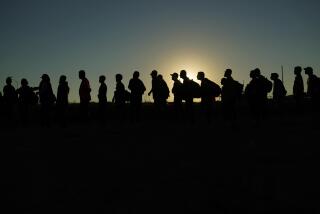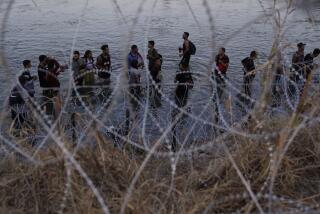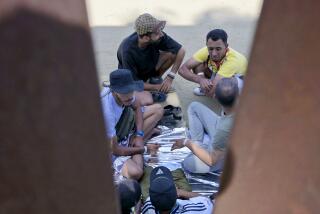U.S. database on immigrant-rights advocates, lawyers and journalists sparks outrage
Reports that the U.S. government kept a database on journalists, activists and immigration attorneys during an investigation into last year’s migrant caravan has stirred outrage among civil rights groups, drawn concern from lawmakers and prompted more people to come forward with additional allegations of being detained by U.S. immigration authorities.
Brendon Tucker, 24, a volunteer from Brownsville, Texas, said he and other volunteers who had been working with the migrant caravan that arrived late last year in Tijuana were stopped at gunpoint by Customs and Border Protection agents in the first days of 2019.
Tucker said he was returning with activist Evan Duke in separate cars from a migrant shelter in Tijuana to San Diego through the San Ysidro Port of Entry when CBP agents directed their vehicles to secondary inspection.
“They pointed guns at me. They used a bullhorn to call me out of the car,” Tucker said. “They tried to take my phone. They tried to take Evan’s phone. And all we were doing was bringing supplies to the migrants in Tijuana.”
Tucker said he is not sure whether he is in a database revealed in leaked documents published Wednesday by San Diego TV station KNSD (NBC7). The documents indicate that the U.S. government has kept dossiers on dozens of activists, advocates, attorneys and journalists it is investigating in relation to the migrant caravan.
“I’m dying to find out if I’m on that list,” said Tucker, who described himself as a solidarity worker not associated with any particular organization. Tucker said he was transporting clothing, food and medicine to various migrant shelters.
Undeterred by the initial encounter, Tucker said he and Duke picked up more supplies in San Ysidro, crossed the border again that same day and dropped them off at migrant shelters in Tijuana.
When they returned, they were again held at gunpoint by CBP officers and this time detained and questioned for six hours, Tucker said.
Tucker said he suspected he was being targeted or investigated since January because every time he goes through a border checkpoint, he faces additional screening and questioning.
“I didn’t see it coming, but I can’t say I’m surprised,” he said.
Among those listed in the Homeland Security documents leaked to KNSD are 10 journalists, seven U.S. citizens, an American attorney and 47 people from Central America. Some of those on the list were denied entry into Mexico and had their passports flagged.
The information has outraged civil liberties and media groups who called tracking, detaining and questioning journalists a blatant violation of free speech rights. The Reporters Committee for Freedom of the Press, along with the Committee to Protect Journalists and Reporters Without Borders, said it plans to meet with U.S. Customs and Border Protection officials to express concerns about this practice.
“If our 1st Amendment means anything, it’s that the government cannot retaliate against journalists based on the content of their reporting,” said Gabe Rottman, director of the Reporters Committee’s Technology and Press Freedom Project.
CBP released a statement Thursday from Andrew Meehan, the assistant commissioner of public affairs, who said the agency’s collection of information followed assaults on Border Patrol agents in November 2018 and January 2019.
A group of about 150 migrants attempted to breach the south side of a San Diego border fence last New Year’s, which resulted in U.S. officials firing tear gas. Officials said some migrants had thrown rocks at them, an account that some witnesses disputed.
CBP said after the Jan. 1 clash that the agency “identified individuals who may have information relating to the instigators and/or organizers of these attacks.”
The CBP statement released Thursday said that the collection of information is a “standard law enforcement practice.”
“CBP does not target journalists for inspection based on their occupation or their reporting,” read the statement from Meehan.
“CBP has policies in place that prohibit discrimination against arriving travelers and has specific provisions regarding encounters with journalists.”
CBP declined to immediately provide a copy of those specific provisions.
The statement added that the Department of Homeland Security’s Office of Inspector General, in conjunction with CBP’s Office of Professional Responsibility, “initiated an inquiry in February” in order to “ensure that all appropriate policies and practices were followed.”
A spokeswoman said she was looking into the incident involving Tucker and Duke.
On Thursday, Reps. Bennie Thompson (D-Miss.), chairman of the Committee on Homeland Security, and Kathleen Rice (D-N.Y.), chairwoman of the Subcommittee on Border Security, Facilitation, & Operations, sent a letter to CBP Commissioner Kevin McAleenan expressing concern and “requesting information about this troubling practice, which raises serious legal and constitutional questions,” according to a statement.
Freelance photojournalist Kitra Cahana, a U.S. citizen, said that being detained, questioned and denied entry into Mexico has affected her work and had a chilling effect on her colleagues.
“I have been denied entry into Mexico twice now, and unable to continue my reporting,” said Cahana, who first told The Times about her experiences last month. “But beyond my own situation, it has created a climate of fear for many of my colleagues who are thinking twice right now about covering the border and migration.”
Both Cahana and Tucker were present during the Jan. 1 incident at the U.S.-Mexico border.
The Mexican government, which denied entry to some of the people in the database, said it didn’t do “illegal surveillance” and would ask the U.S. to clarify any possible cases of “illegal spying.”
According to a joint statement from the Foreign Relations Department and the Department of Security and Citizen Protection, “Mexico welcomes all foreign visitors who, obeying immigration laws, carry out in our territory tourism or professional activities.”
Tucker said during his second stop by CBP a few days after the Jan. 1 incident, agents confiscated his video camcorder and his friend’s phone. He said they never returned the items.
“At the end of the day, they just don’t like what we’re doing,” Tucker said. “I know I didn’t do anything illegal to be put on any list.”
Wendy Fry writes for the San Diego Union-Tribune.
More to Read
Start your day right
Sign up for Essential California for news, features and recommendations from the L.A. Times and beyond in your inbox six days a week.
You may occasionally receive promotional content from the Los Angeles Times.






